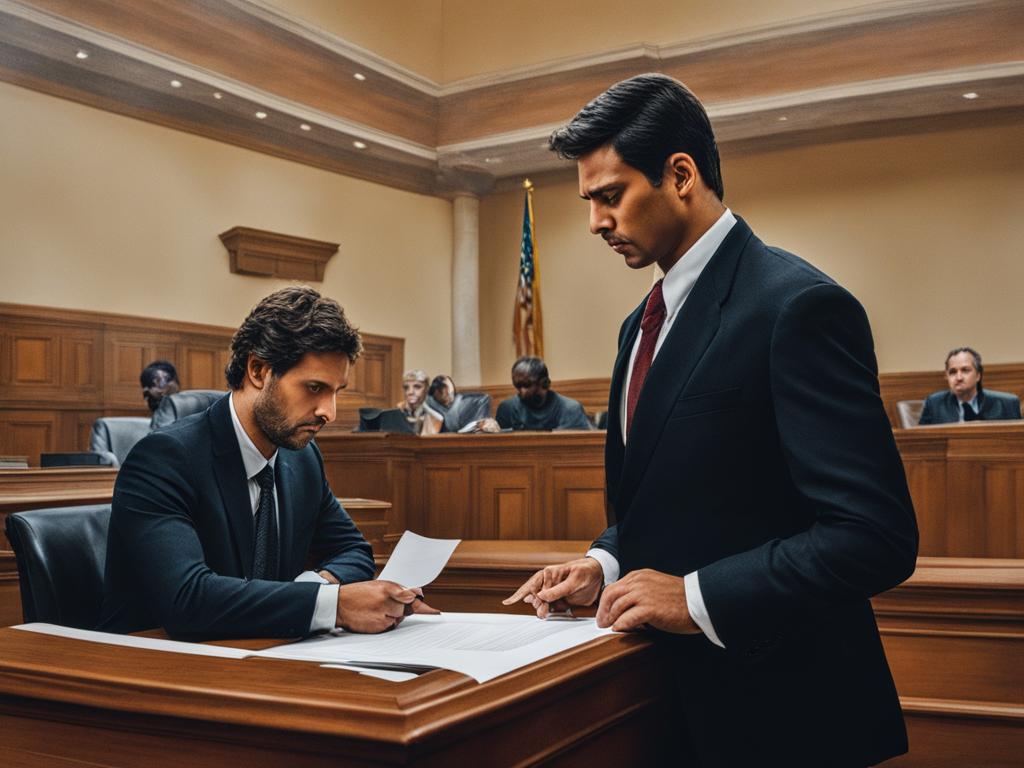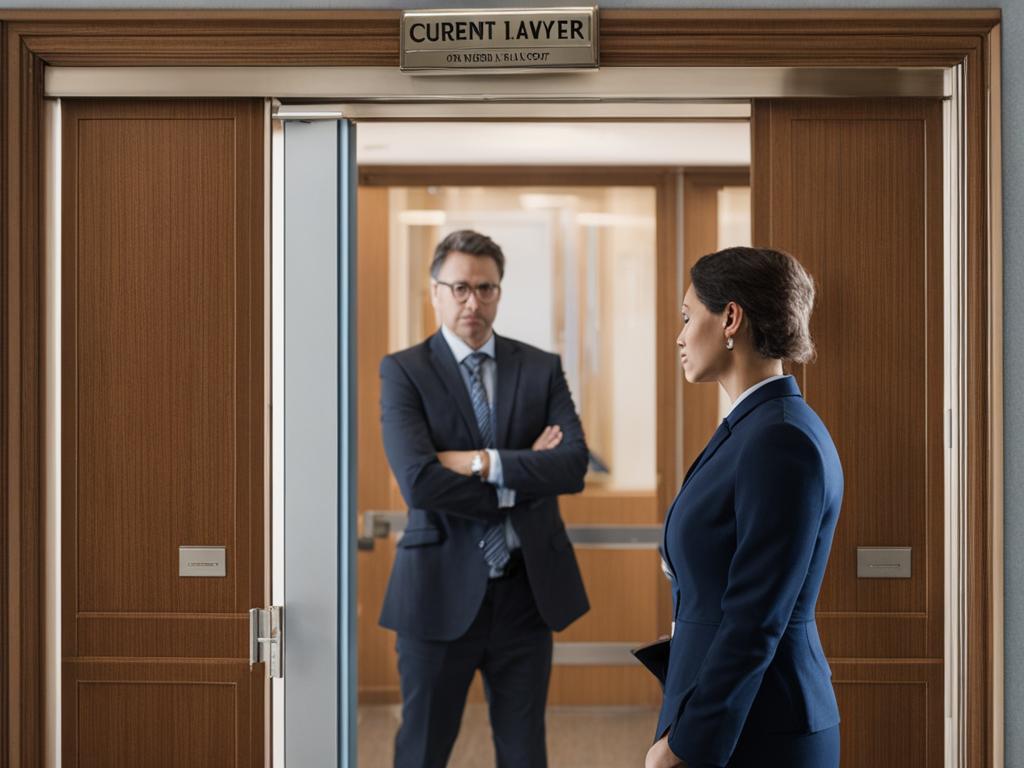Deciphering When Is It Too Late to Fire Your Attorney
When considering whether it is too late to fire your attorney, there are several factors to keep in mind. While you have the right to fire your attorney at any time, it is essential to consider the consequences and the potential impact on your case. It is important to evaluate the reasons for wanting to make a change, such as poor communication, lack of experience, conflicts of interest, or billing disputes. Additionally, understanding the legal grounds for firing your attorney, such as malpractice, breach of contract, or ethical misconduct, can help you make an informed decision. Once you have made the decision to fire your attorney, it is crucial to follow the necessary steps, including notifying your attorney in writing, retrieving your case files, and finding a new attorney. Timing is important, especially if your case is in progress or a trial is pending. It is never too late to reassess your legal representation, but thoughtful consideration and proper procedure are key to ensuring a smooth transition and protecting your interests.
Key Takeaways:
- Consider the consequences and potential impact on your case before firing your attorney.
- Evaluate the reasons for wanting to make a change, such as poor communication or conflicts of interest.
- Understand the legal grounds for firing your attorney, such as malpractice or breach of contract.
- Follow the necessary steps, including notifying your attorney in writing and finding a new attorney.
- Timing is important, especially if your case is in progress or a trial is pending.
Signs That It’s Time to Consider Firing Your Attorney
When working with an attorney, there are certain signs that may indicate it’s time to consider firing them. These signs can indicate issues that may be detrimental to your case and warrant a change in legal representation. Here are some key signs to watch out for:
- Lack of communication: If your attorney consistently fails to respond to your calls or emails, or doesn’t keep you informed about the progress of your case, it may be a sign of poor communication and lack of dedication.
- Lack of experience: If your attorney doesn’t have the necessary expertise or knowledge in handling your specific legal matter, it can hinder your chances of a successful outcome. It’s important to have confidence in your attorney’s abilities.
- Conflicts of interest: If your attorney has a conflict of interest that prevents them from fully representing your interests, it may be a sign that you need to find new legal representation. Your attorney should always prioritize your best interests.
- Billing disputes: If you consistently have disagreements with your attorney over fees or charges, it can create unnecessary tension and strain on the attorney-client relationship. It’s essential to have transparency and clarity when it comes to billing.
These signs should not be taken lightly, as they can impact the outcome of your case. If you notice one or more of these signs, it may be time to reassess your attorney and consider making a change to protect your interests.
Legal Grounds for Firing Your Attorney
When it comes to firing your attorney, it is important to understand the legal grounds that can justify terminating the attorney-client relationship. These legal grounds include:
- Malpractice: This occurs when your attorney commits a serious error in your case or violates ethical rules, which can have a significant impact on the outcome of your legal matter.
- Breach of Contract: If your attorney fails to fulfill the terms of your agreement, such as not providing agreed-upon services or overcharging you, it can provide valid grounds for termination.
- Conflict of Interest: It is crucial for your attorney to be fully committed to representing your interests. If your attorney has a conflict of interest that hinders their ability to do so effectively, it may be necessary to find new legal representation.
Understanding these legal grounds is essential to navigate the process of firing your attorney and protecting your rights. It is recommended to consult with another attorney to discuss your options and ensure that you are making an informed decision.
Table: Legal Grounds for Firing Your Attorney
| Grounds | Description |
|---|---|
| Malpractice | Your attorney commits a serious error or violates ethical rules. |
| Breach of Contract | Your attorney fails to fulfill the terms of your agreement. |
| Conflict of Interest | Your attorney has a conflict that hinders their ability to fully represent your interests. |
By understanding the legal grounds for firing your attorney and following the necessary steps, you can ensure a smooth transition to new legal representation and protect your rights throughout the process.
Steps to Take When Firing Your Attorney
When you have made the decision to fire your attorney, there are certain steps you need to take to ensure a smooth transition. First, you should notify your attorney in writing of your decision to terminate the relationship, specifying the reasons for termination and the effective date. It is important to communicate clearly and professionally.
Next, you should retrieve all your case files and documents from your attorney. This may require payment for copies of the documents. Finding a new attorney should be a priority, ensuring you choose someone with the necessary experience and expertise for your case. It is important to discuss any remaining fees and expenses with your current attorney to avoid any issues.
Finally, upon retaining new counsel, you or your new attorney should notify the court of the change and file a motion for substitution of counsel. Following these steps will help facilitate the process of firing your attorney and transitioning to new legal representation.
| Steps to Take When Firing Your Attorney |
|---|
| 1. Notify your attorney in writing of your decision to terminate the relationship, specifying the reasons for termination and the effective date. |
| 2. Retrieve all your case files and documents from your attorney. |
| 3. Find a new attorney with the necessary experience and expertise for your case. |
| 4. Discuss any remaining fees and expenses with your current attorney. |
| 5. Notify the court of the change and file a motion for substitution of counsel. |
How to Fire Your Lawyer: Best Practices for Attorneys
Firing a client is never an easy decision for an attorney, but there may be situations where it becomes necessary. To effectively and professionally terminate the attorney-client relationship, attorneys should follow certain best practices. It is important to review the retainer agreement to ensure compliance with ethical and legal obligations, including any termination clauses or notice periods. Identifying the reasons for termination and clearly communicating them to the client is crucial. This should be done through a written notice that outlines the reasons for termination and offers any referrals or resources that may be helpful to the client. If the case is still pending, filing the necessary paperwork with the court, such as a motion to withdraw as counsel, is essential. Protecting client confidentiality should always be a priority, including the return of documents and files related to the case. Firing a client should be done with care and professionalism, ensuring the lawyer’s reputation and ethical obligations are upheld.

In the process of firing a client, it is important for attorneys to consider the specific provisions in the retainer agreement that may govern termination. Some agreements may include clauses that outline the procedure for termination or any potential penalties. Attorneys should carefully review these provisions and ensure compliance to protect their own rights and interests.
When terminating the attorney-client relationship, attorneys should provide written notice to the client in a clear and concise manner. This notice should clearly state the reasons for termination and offer any necessary referrals or resources to assist the client in finding new legal representation. It is crucial to maintain professionalism and respect throughout this process, even if there are underlying conflicts or disagreements.
Filing the necessary paperwork with the court is an important step in the process of firing a client. This may include a motion to withdraw as counsel, which formally notifies the court of the attorney’s intent to terminate the representation. By following proper procedures and notifying the court, attorneys can ensure that there are no disruptions to the legal process and that the client’s interests are protected.
Reasons Why Lawyers Fire Clients
Lawyers may choose to terminate their representation of a client for various reasons. One common reason is a breakdown in the attorney-client relationship, which can occur due to a lack of trust, poor communication, or disagreements about the case strategy. Non-payment of fees is another reason why lawyers may fire clients. If a client fails to pay their legal bills or does not make arrangements for payment, it may lead to the termination of the attorney-client relationship. Conflict of interest is also a significant factor that may result in the lawyer firing a client. If the lawyer discovers a conflict that prevents them from fully representing the client’s interests, they may choose to end the relationship. It is important to note that lawyers cannot terminate representation without good cause and must act in the best interests of the client. Understanding these reasons can help clients evaluate their relationship with their attorney and determine if a change is necessary.
Reasons Lawyers Fire Clients:
- Breakdown in attorney-client relationship
- Non-payment of fees
- Conflict of interest
Lawyers take their ethical obligations seriously and have a duty to provide effective representation to their clients. However, there are circumstances where the attorney-client relationship becomes untenable and lawyers may have no choice but to fire clients. A breakdown in the attorney-client relationship, often due to a lack of trust or poor communication, can significantly hamper the progress of a case. Lawyers need to work effectively with their clients to ensure a successful outcome, and when that relationship breaks down, it may be in the best interest of both parties to part ways.
Non-payment of fees is another reason why lawyers may choose to fire clients. Legal representation is a professional service, and lawyers have the right to be compensated for their time and expertise. When clients fail to pay their legal bills or do not make arrangements for payment, it can strain the attorney-client relationship. Lawyers rely on timely payment to cover their own expenses and maintain their practice, so non-payment can be a valid reason for termination.
Conflict of interest is yet another reason why lawyers may fire clients. Lawyers have a duty to act in the best interests of their clients and avoid any conflicts that could compromise their ability to provide effective representation. If a conflict arises that prevents the lawyer from fulfilling this duty, such as representing both parties in a dispute or having a personal relationship with an opposing party, the lawyer may need to terminate the attorney-client relationship to maintain professional integrity.
It is important to note that lawyers cannot terminate representation without a valid reason. They must act in accordance with ethical rules and always prioritize the best interests of their clients. If you find yourself in a situation where your lawyer wants to fire you as a client, it is crucial to consult with another attorney to understand your rights and options. Legal representation is a partnership, and it is essential to find a lawyer who is a good fit for your needs and can provide the support you deserve.
Firing Your Attorney: Understanding the Implications of a Contract
When considering whether to fire your attorney, it’s important to understand the implications if you have signed a contract with them. While you have the right to terminate your attorney-client relationship at any time, it’s crucial to review the specific provisions in your contract regarding termination and any potential penalties for doing so.
If your contract outlines certain procedures or notice periods for termination, it’s essential to follow them to avoid any legal consequences. Consulting with another attorney can provide valuable insights and help you navigate your contractual obligations while ensuring that you protect your legal rights.

By seeking legal advice, you can gain a better understanding of your options and make an informed decision about whether to proceed with terminating your attorney-client relationship or to explore alternative solutions within the parameters of your contract. Remember, protecting your interests and ensuring proper legal representation should always be your top priority.
Can You Consult With Another Lawyer If You Already Have One?
Yes, you have the right to consult with another lawyer even if you already have one. Seeking a second opinion or consulting with multiple lawyers is common, especially when making important legal decisions. It is understandable that you want to ensure that you have the best possible representation for your case, and consulting with other lawyers can provide valuable insights.
When consulting with another lawyer, it is important to communicate clearly with your existing lawyer about your intentions. Open and transparent communication can help maintain a positive attorney-client relationship and ensure that all parties are on the same page. It is important to remember that consulting with another lawyer does not automatically mean that you have to switch attorneys. It simply allows you to gather more information and perspectives to make an informed decision about your legal representation.
It’s important to note that consulting with another lawyer does not necessarily mean that you are dissatisfied with your current attorney. It may simply be a proactive step to seek additional advice and ensure that you are taking the best course of action for your case. Ultimately, the decision to switch lawyers or retain your current attorney is up to you, and consulting with another lawyer can help you make an informed choice.

Benefits of Consulting with Another Lawyer:
- Obtain a fresh perspective on your case
- Explore alternative strategies and approaches
- Gain additional insights and expertise
- Address any concerns or doubts you may have
- Make an informed decision about your legal representation
“Seeking a second opinion or consulting with multiple lawyers is common, especially when making important legal decisions.”
When Is It Too Late to Fire Your Criminal Attorney?
Timing plays a crucial role when it comes to firing your criminal attorney. While you have the right to terminate the attorney-client relationship at any time, doing so too late in the process can have potential consequences. It’s important to consider the stage of your criminal case and the impact it may have on the defense strategy.
Firing your criminal attorney late in the process can cause disruptions and delays. The new attorney will need time to familiarize themselves with your case, review evidence, and develop an effective defense strategy. This can lead to additional costs and may even result in missed opportunities if critical deadlines are not met.
On the other hand, firing your attorney early in the process allows you to reassess your legal representation and find a better fit for your needs. It gives you a chance to secure a more experienced attorney or someone with a different approach that may improve your chances of a favorable outcome.
“Firing your criminal attorney should be a thoughtful decision, considering both the potential consequences and the importance of timing in criminal cases.”
It’s essential to carefully evaluate your reasons for wanting to fire your criminal attorney and consult with another legal expert if necessary. They can provide guidance on the potential consequences and help you make an informed decision that protects your rights and best interests.

How to Know If Your Lawyer Is Selling You Out
If you suspect that your lawyer is not acting in your best interests and may be “selling you out,” there are several signs to look for. Lack of communication, where your lawyer does not respond to calls or emails or fails to keep you informed about your case, can be a red flag. Lack of trust can also indicate a problem, where you doubt your lawyer’s commitment or believe that they are not maximizing your settlement. Unprofessional conduct, such as missed meetings or lack of preparation, may suggest deeper issues with your lawyer’s performance. Disciplinary actions or violations of ethical rules can also be a sign that your lawyer is not acting in your best interests. Failure to inform you about settlement offers, even if they are too low, can be another indication that your lawyer is not acting ethically. It is important to pay attention to these signs and consult with another lawyer if you have concerns about your current representation.

| Signs of a Lawyer Selling You Out |
|---|
| Lack of communication |
| Lack of trust |
| Unprofessional conduct |
| Disciplinary actions |
| Failure to inform about settlement offers |
These signs may indicate that your lawyer is not acting in your best interests and may be more focused on their own agenda. If you notice any of these signs or have concerns about your current representation, it is important to seek the advice of another lawyer. They can provide you with an objective evaluation of your case and guide you on the best course of action to protect your rights and interests.
Quotes
“Lack of communication is a major red flag. Your lawyer should be responsive and keep you informed about your case.” – Legal Expert
“If you don’t trust your lawyer, it’s time to reconsider your representation. Trust is essential in the attorney-client relationship.” – Legal Expert
- Signs of a Lawyer Selling You Out:
- Lack of communication
- Lack of trust
- Unprofessional conduct
- Disciplinary actions
- Failure to inform about settlement offers
By being aware of these signs and taking action when necessary, you can ensure that your lawyer is acting in your best interests and effectively representing you in your legal matter.
Can I Switch Lawyers in My Personal Injury Case?
When facing a personal injury case, it is essential to have confidence in your legal representation. If you find yourself questioning your current attorney’s abilities or feeling unsatisfied with their performance, it may be time to consider switching lawyers. Making the decision to switch lawyers in a personal injury case is within your rights as a client, and it can offer several benefits that may improve your chances of a favorable outcome.
One of the primary advantages of switching lawyers is the opportunity to reassess your legal representation. By consulting with a new attorney, you can gain a fresh perspective on your case and potentially uncover new strategies or approaches that could benefit you. A different lawyer may have a different level of experience or expertise that could bring new insights to your situation, increasing your chances of success.
Getting a second opinion is another valuable aspect of switching lawyers. It allows you to hear alternative perspectives on your case, helping you make more informed decisions about how to proceed. A second opinion can provide you with additional legal insights and help you evaluate the strengths and weaknesses of your current legal strategy.
Ultimately, the decision to switch lawyers in a personal injury case comes down to your comfort level and confidence in your legal representation. If you believe that a change is necessary to protect your interests and achieve the best possible outcome, consulting with a new attorney and exploring your options is an important step to consider.

Benefits of Switching Lawyers in a Personal Injury Case:
- Reassess your legal representation
- Gain a fresh perspective on your case
- Uncover new strategies or approaches
- Access to different levels of experience or expertise
- Receive a second opinion on your case
- Evaluate the strengths and weaknesses of your current legal strategy
Conclusion
In conclusion, firing your attorney is a significant decision that should be carefully considered. While you have the right to fire your attorney at any time, it is important to weigh the consequences and thoroughly evaluate your reasons for wanting to make a change. Whether it is poor communication, lack of experience, conflicts of interest, or billing disputes, these are valid factors to reassess your legal representation.
Understanding the legal grounds for firing your attorney, such as malpractice, breach of contract, or conflict of interest, is crucial. It enables you to make an informed decision and protects your rights. Following the necessary steps, such as notifying your attorney in writing, retrieving your case files, finding a new attorney, and notifying the court, is vital to ensure a smooth transition.
Protecting your rights should be a priority throughout the process. If you have any doubts or concerns about your current representation, consulting with another legal expert can provide valuable insights. Making an informed decision and taking appropriate action can ultimately lead to better outcomes for your legal case.
FAQ
When is it too late to fire your attorney?
While you have the right to fire your attorney at any time, it is important to consider the consequences and potential impact on your case.
What are the signs that it’s time to consider firing your attorney?
Signs may include a lack of communication, lack of experience, conflicts of interest, and billing disputes.
What are the legal grounds for firing your attorney?
Legal grounds for firing your attorney include malpractice, breach of contract, and conflict of interest.
What steps should I take when firing my attorney?
Steps include notifying your attorney in writing, retrieving case files, finding a new attorney, and notifying the court.
What are the best practices for attorneys when firing a client?
Best practices include reviewing the retainer agreement, clearly communicating the reasons for termination, protecting client confidentiality, and filing necessary paperwork.
Why do lawyers fire clients?
Lawyers may fire clients due to a breakdown in the attorney-client relationship, non-payment of fees, or conflicts of interest.
Can I fire my attorney if I signed a contract?
Yes, you have the right to fire your attorney even if you have signed a contract, but it is important to review the terms of the contract.
Can I consult with another lawyer if I already have one?
Yes, you have the right to consult with another lawyer, especially when making important legal decisions, but clear communication with your existing lawyer is crucial.
When is it too late to fire your criminal attorney?
You have the right to fire your criminal attorney at any time, but the timing can have significant consequences in your case.
How do I know if my lawyer is selling me out?
Signs may include a lack of communication, lack of trust, unprofessional conduct, disciplinary actions, and failure to inform about settlement offers.
Can I switch lawyers in my personal injury case?
Yes, you have the right to switch lawyers in your personal injury case to reassess your current representation and seek a second opinion.

